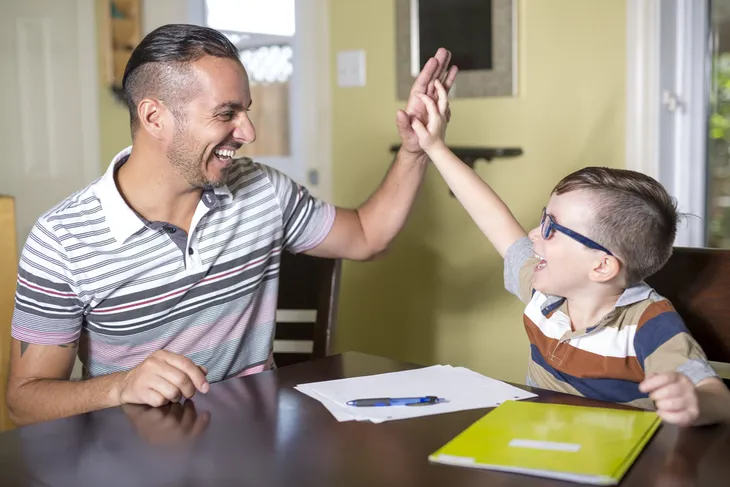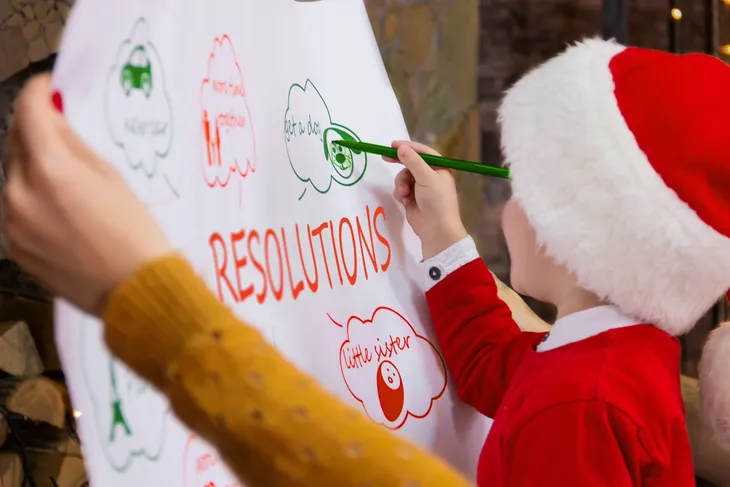Happy New Year! The start of a new year is usually the time when many Americans make resolutions they hope to keep throughout the year (whether they keep them is another story). This annual tradition shouldn’t exclude kids, who can work towards healthy goals with your help and guidance.
Obviously, you’re not going to suggest to your kids that they should drink less, or spend less time at the office. However, you can get them on the right path to improvement with these six tips to help them choose a realistic (and healthy) goal for the New Year…
1. Be Positive About Resolutions
As you probably know, your kids mimic your every move, and if you are very hesitant to make a resolution, so likely will they be. Parents magazine says that you shouldn’t suggest resolutions to kids in a negative way, as if they’re doing something wrong. Just treat it like a self-improvement exercise (and keep in mind more physical activity is a great way to improve), and a chance for your children to challenge themselves.
One way to get kids on board with this is by pointing out their accomplishments instead of their mistakes throughout the previous year, notes the article. Remind them that by pushing themselves a little harder, they can accomplish things they didn’t yet think were possible (like learning a new instrument).
2. Make Group Resolutions
There’s power in numbers, and the same goes when making a commitment to something, added Parents magazine. Suggestions include working towards a charitable donation, getting out to exercise more, or committing to cleaning up the neighborhood parks.
You can also encourage your children to make their own resolutions along with the family resolutions, since they’re already thinking about ways to improve themselves and their life. Think about ideas such as your children visiting an elderly neighbor or doing something else out of kindness that can make them feel good in return, notes the magazine.
3. Start Small
EveryDay Family says you should help your kids make…well, baby steps when it comes to committing to targets for the new year. For example, the online source says instead of telling your kid to make a resolution to improve in math, you can suggest they study at least 15 minutes per night solving math problems that are giving them trouble.
The next step could be challenging them to achieve a high mark on a math test. However, the source warns not to use past struggles as motivation for improvement. The talk should encourage moving forward and growing their skills.
4. Let Them Choose From Your Suggestions
Kids like to feel part of decisions, especially when it directly impacts them. While they might not have any say if you need to move to a new city for work, you can definitely let them be involved in choosing a resolution for the new year, said EveryDay Family.
Don’t let them have free reign about their choice – or they might choose an unhealthy goal like eating more ice cream this year. Suggest a handful of things specific to your child’s needs, and let them choose the one that strikes them the most. For example, if they’re spending too much time in front the television, make one of the suggestions playing outside for 30 minutes a day. This will more likely give them a better sense of ownership and excitement about achieving the goal.
5. Make Resolutions Age Appropriate
Women’s Weekly reminds you to make the resolution suggestions suitable for your child’s age. While 5-years might seem like a lot to you, the expectations on a 3-year-old and an 8-year-old should be quite different. For example, you could encourage your toddler to clean up their toys after playing, while an 8-year-old could try something more involved like gathering up the trash for garbage day.
If you don’t make the resolution suitable for your child’s age, it could end up demotivating them by being too difficult, or even by not being challenging enough (and therefore boring). If you have a teenager that you want to help motivate, perhaps you could suggest they improve their hygiene (without telling them they have less than optimal hygiene–that part is for you to figure out).
6. Don’t Scold for Not Reaching Goals
While a gentle follow up like “how’s the —– coming along?” is fair, don’t nag your kids into doing the work, warns PBS.org. Instead, try an opposite approach, suggests the American public broadcaster. Instead of pointing out goals that have fallen short, recognize the steps that have been taken.
Kids love the sense of accomplishment, and it’s a lot more pleasant to lay praise on your child than scorn. If a particular resolution is not being met, perhaps sit down with your child and ask them how you can help them reach it. The key element, notes PBS, is that your child shows signs of making an effort.








